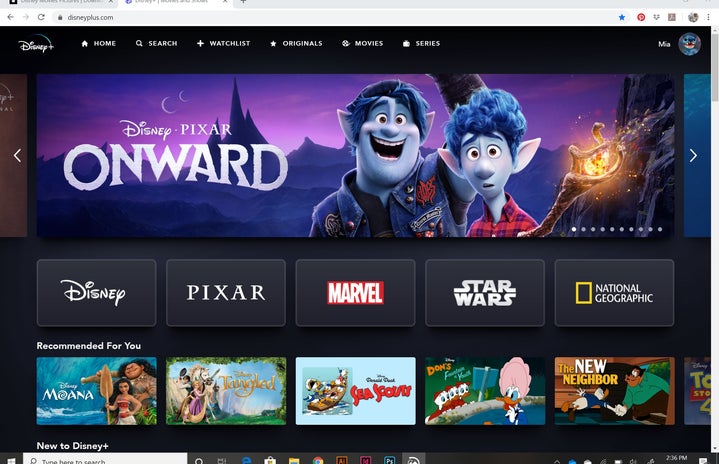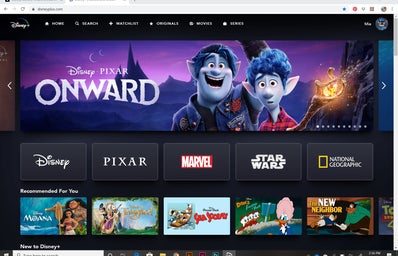To say that I’m a tough critic of recent Disney movies would be an understatement. As someone who grew up watching original masterpieces like Lilo & Stitch, Ratatouille, Monsters Inc and a few dozen other films that remain imprinted into the fond memories of most members of Gen Z, I find that the majority of new films released by Disney Pixar and Walt Disney Studios simply aren’t up to snuff.
While my friends raved about Frozen II, I couldn’t get past the watered-down cultural depictions, convenient backstory and weak plot structure. I agree firmly with the viewers who thought Toy Story 4 was just one movie too many, and I refuse to watch the “live-action” productions of animal-centered films that are really just remakes of animated movies with a less compelling form of animation.
Yet, I’m here to say that Onward pleasantly surprised me.
In a fantasy world where magic has been replaced by the convenience of technology, Ian and his brother Barley set out on a quest to bring back (the top half of) their deceased father when he leaves them the instructions for a visitation spell on Ian’s 16th birthday.
As with virtually every Pixar movie, the animation proves to be nothing less than a stunning feat of digital innovation and aesthetic imagination. That is one area Pixar never fails to impress audiences, and it hardly needs to be said.
But Onward also provides a particularly powerful combination of relatable family struggles and nostalgic DND-inspired world-building that had me smiling (and tearing up) more than a few times while watching.
Barley, Ian’s older and considerably more optimistic brother, drives the story with his expert knowledge of a magic roleplaying game that begins to resemble real life more and more as the two forge “onward” on their quest. From the start, it’s clear that the events of their journey—the various monsters and challenges they face, the types of spells they have to figure out how and when to cast—are all rooted deeply in Dungeons and Dragons, a tabletop roleplaying game that’s made a huge resurgence among fantasy lovers and throughout pop culture in recent years.
Having watched my fair share of DND campaigns, I drew a lot of connections between the types of stories I’d seen my friends construct and the linear, quick-turning narrative of Onward. Barley and Ian make use of whatever abilities and resources they’ve got to problem solve through each new situation they find themselves in, which any DND player would recognize as a fundamental skill of the game.
It was through that lens that I was able to appreciate the storytelling of Onward much more than I had other recent Disney movies. Its writers infused the movie with the elements of its inspirations deeply and whole-heartedly, without feeling the need to change its characters or plot to fit a more typical Disney formula.
Ian’s relationship with Barley starts out tenuous and develops over the movie in a way that managed to surprise me. Amidst the looming emotions of bringing their dad back to life for a day, their hidden fears and regrets are exposed for the first time, and they’re forced to reconcile their understandings of each other as brothers in order to complete the quest.
For the extent of the movie, I carried a very strong uncertainty about the ending. The story seems to set itself up for something painfully cliché, but takes a bold turn that I realized, while watching the credits roll, was the absolute best choice the writers could have made.
Unlike in Frozen II and most other Disney movies, the creators didn’t shy away from an ending that wasn’t totally happy, or exactly what the characters had hoped for from the beginning. They gave viewers something bittersweet and a touch open-ended, and it was absolutely perfect.
That being said, I didn’t find the movie to be completely flawless (as virtually no stories are). With the combination of magic and technology in one world, the writers make a few stretchy explanations as to why the day can’t simply be saved with a phone call, a mapping app or Google. I also didn’t find the humor to be quite as on-point as it usually is in Pixar movies.
But the emotional core of the story makes it easy to overlook those flaws, and the ending solidified it as a Disney movie that is definitively not overrated in my book. So, if you haven’t considered purchasing a Disney+ subscription for Star Wars, Marvel or any of the other beloved film franchises, this critic thinks you can take a pretty sure bet on Onward.
Want to see more HCFSU? Be sure to like us on Facebook and follow us on Instagram, Twitter and Pinterest!




